主谓语一致的规则
高一语法:主谓一致

汉语很难学。
Chinese are very hospitable.
中国人非常好客。
三、谓语动词用单复数均可
3.以-ics 结尾的词作主语时,表示学科时,谓语动 词用单数形式;表示特定事物时,谓语动词用复 数形式。 例如: Statistics is a branch of mathematics.
雅典是希腊的首都。
Good news comes.
好消息来了。
一、谓语动词用单数
8.单个的不定式短语,动名词或名词性从句做主语时,谓 语动词用单数形式。 例如: To see is to believe.
眼见为实。
Reading is important in second language acquisition.
我校有一百多名学生来自南方。
一、谓语动词用单数
5.由each …and each…,every…and every…,many a …and many a …,no…and no…做主语时,谓语动 词用单数形式。 例如: Every boy and every girl was asked to show their identity card.
老年人受到年轻人的尊敬。
The accused is involved in a case.
被告涉嫌了这起案件。
三、谓语动词用单复数均可
5.用and连接的两个名词作主语,表示同一个人或 事物时,谓语动词用单数;表示不同的人或事物 时,谓语动词用复数形式。 例如: The singer and dancer is from Dunhuang.
李明是从那个大学毕业的最聪明的学生。
四、主谓一致的特殊结构
5.主语后带有as well as、along with、together with、 rather than、but、except等引起的介词短语时,谓语动 词的单复数和主语的单复数相一致。 例如: A doctor together with two nurses , has been sent to that poor village to help sick people.
英语语法原则主谓一致三原则
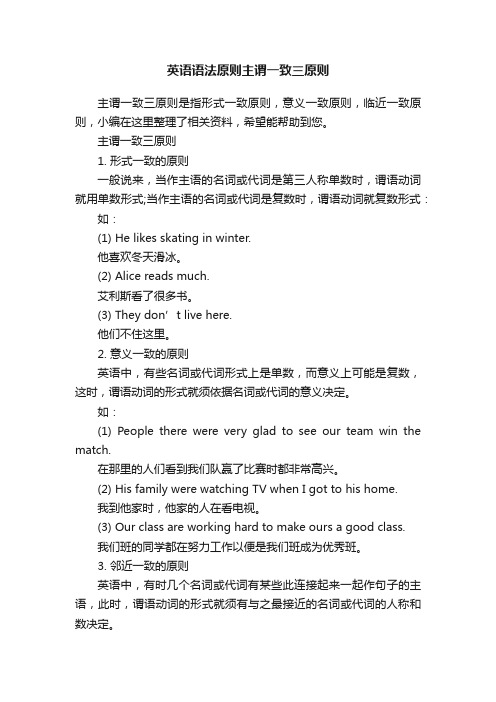
英语语法原则主谓一致三原则主谓一致三原则是指形式一致原则,意义一致原则,临近一致原则,小编在这里整理了相关资料,希望能帮助到您。
主谓一致三原则1. 形式一致的原则一般说来,当作主语的名词或代词是第三人称单数时,谓语动词就用单数形式;当作主语的名词或代词是复数时,谓语动词就复数形式:如:(1) He likes skating in winter.他喜欢冬天滑冰。
(2) Alice reads much.艾利斯看了很多书。
(3) They don’t live here.他们不住这里。
2. 意义一致的原则英语中,有些名词或代词形式上是单数,而意义上可能是复数,这时,谓语动词的形式就须依据名词或代词的意义决定。
如:(1) People there were very glad to see our team win the match.在那里的人们看到我们队赢了比赛时都非常高兴。
(2) His family were watching TV when I got to his home.我到他家时,他家的人在看电视。
(3) Our class are working hard to make ours a good class.我们班的同学都在努力工作以便是我们班成为优秀班。
3. 邻近一致的原则英语中,有时几个名词或代词有某些此连接起来一起作句子的主语,此时,谓语动词的形式就须有与之最接近的名词或代词的人称和数决定。
如:(1) There is a desk and five chairs in his room.他房间里有一张办公桌和五把椅子。
(2) There are five chairs and a desk in his room.他房间里有五把椅子和一张办公桌。
(3) Either you or Li Lei is going to be sent there.要么是你要么是李蕾将被派到那里去。
关于主谓一致的用法规律

关于主谓一致的用法规律惠阳三中刘沁姗在备战中考英语阶段,我认为主谓一致这一用法规律非常重要,值得进行好好的归纳总结。
而且学生也掌握的并不好,由此我通过结合初三复习资料—南方新课堂(中考风向标)得出以下用法规律。
一、最基本却贯穿英语知识的学习,当以单数名词或代词、动词不定式短语作主语时,谓语动词用单数;主语为复数时,谓语用复数。
在这里举一个“动词不定式短语作主语”的例子:To see is to believe. 简单但却结构特别的例子最容易让学生记住和接受。
二、由and或both and 连接的并列成分作主语时,谓语动词用复数。
但并列主语如果指的是同一个人、同一事物或同一概念,谓语动词用单数。
在此,先看两个例子:1、The poet and writer has come. 2、The poet and the writer have come. 通过对比这两个例子可以得出:第一个例句的主语指的是同一个人,第二句则指的是两个不同的人,所以主语的单复数决定了谓语的不同。
三、由and连接的并列单数主语之前如果分别由each, every, no修饰时,其谓语动词要用单数形式。
例如:In our country every boy and every girl has the right to receive education.在此再给另一个例子进行对比:Now the students each have an English-Chinese dictionary.这个例子真正的主语是the students,所以谓语用复数。
四、主语时单数时,尽管后面跟有but, except, besides, with, as wellas, together with, along with, like等引导的介词短语时,谓语动词与前面的主语一致。
这个就是常用的“就远原则”。
例如:He, together with his parents, is going to visit Shanghai.句子的主语是he,所以谓语动词用单数。
主谓一致的三个原则
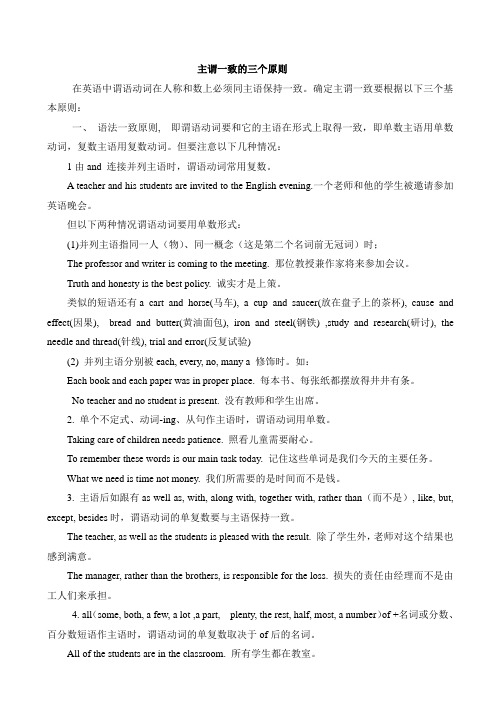
主谓一致的三个原则在英语中谓语动词在人称和数上必须同主语保持一致。
确定主谓一致要根据以下三个基本原则:一、语法一致原则, 即谓语动词要和它的主语在形式上取得一致,即单数主语用单数动词,复数主语用复数动词。
但要注意以下几种情况:1由and 连接并列主语时,谓语动词常用复数。
A teacher and his students are invited to the English evening.一个老师和他的学生被邀请参加英语晚会。
但以下两种情况谓语动词要用单数形式:(1)并列主语指同一人(物)、同一概念(这是第二个名词前无冠词)时;The professor and writer is coming to the meeting. 那位教授兼作家将来参加会议。
Truth and honesty is the best policy. 诚实才是上策。
类似的短语还有a cart and horse(马车), a cup and saucer(放在盘子上的茶杯), cause and effect(因果), bread and butter(黄油面包), iron and steel(钢铁) ,study and research(研讨), the needle and thread(针线), trial and error(反复试验)(2) 并列主语分别被each, every, no, many a 修饰时。
如:Each book and each paper was in proper place. 每本书、每张纸都摆放得井井有条。
No teacher and no student is present. 没有教师和学生出席。
2. 单个不定式、动词-ing、从句作主语时,谓语动词用单数。
Taking care of children needs patience. 照看儿童需要耐心。
To remember these words is our main task today. 记住这些单词是我们今天的主要任务。
主谓一致的基本原则
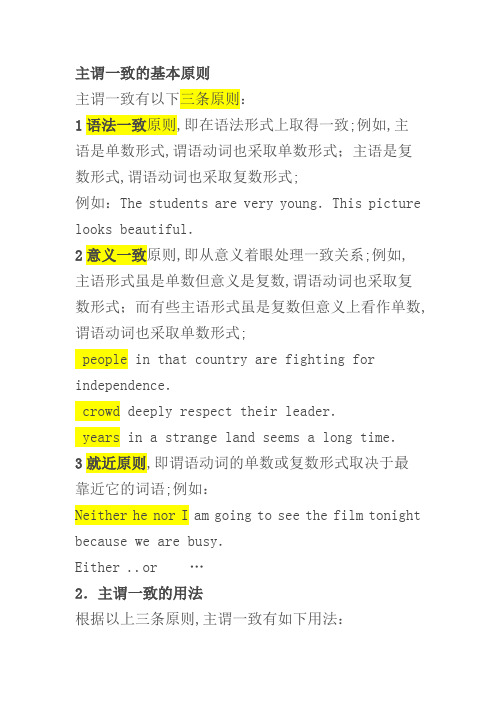
主谓一致的基本原则主谓一致有以下三条原则:1语法一致原则,即在语法形式上取得一致;例如,主语是单数形式,谓语动词也采取单数形式;主语是复数形式,谓语动词也采取复数形式;例如:The students are very young.This picture looks beautiful.2意义一致原则,即从意义着眼处理一致关系;例如,主语形式虽是单数但意义是复数,谓语动词也采取复数形式;而有些主语形式虽是复数但意义上看作单数,谓语动词也采取单数形式;people in that country are fighting for independence.crowd deeply respect their leader.years in a strange land seems a long time.3就近原则,即谓语动词的单数或复数形式取决于最靠近它的词语;例如:Neither he nor I am going to see the film tonight because we are busy.Either ..or …2.主谓一致的用法根据以上三条原则,主谓一致有如下用法:1下列结构作主语,谓语动词一般用单数形式a.表示时间、重量、长度、价值的名词作主语,谓语动词通常用单数形式;例如:hundred miles is a long distance.dollars is a high price for that book.b.由anyone,anything,anybody,noone,nothing,everyone,everybody,everything,some one,somebody,each,either,neither等不定代词作主语,谓语动词使用单数形式;例如:is knocking at the door.is better than going to the movie tonight.c.由“a series of,a kind of,a portion of +名词”作主语,谓语动词应用单数形式;例如:A series of debates is scheduled to be held next week.d.由“many a,more than one +单数名词”作主语,尽管意义上表示复数,但谓语动词仍采用单数形式;例如:Many a person in these circumstances has hoped for a long break.There is more than one answer to your question.e.“名词+and+名词”作主语,表示同一人、同一概念或事物时,谓语动词用单数形式;例如:A writer and educator is giving a lecture now.这个人既是作家又是教育家A writer and a educatorf."either neither + of +复数名词或代词"作主语,谓语动词用单数形式;例如:either of you takes a vacation now,we will not be able to finish the work.of them wants to come.g.在each…and each…,every…and every…等结构之后,谓语动词用单数形式;例如:Each man and each woman has the right to vote.h.动词不定式、动名词或分句作主语时,谓语动词一般用单数形式;例如:What I want to say is none of your business.Listening to the classical music is enjoyable.i.以-ics结尾的复数名词指一门学科时,如politics政治学,mathematics数学,statistics统计学,acoustics声学,linguistics语言学等,谓语动词用单数形式;例如:Mathematics is what he majors in.2下列结构作主语,谓语动词单复数形式取决于of后的名词;意义一致a.由“a11,none,no,most,half,the last,the rest,the remainder+of+名词”等不定代词作主语,谓语动词单复数形式由of后名词的单复数而定;例如:None of the food is wasted.None of the students were absent.The rest of the lecture was dull.The rest of the bikes were on sale yesterday.b.由"lots of,heaps of,loads Of,scads of +名词”作主语,谓语动词单复数形式由of后名词的单复数而定;例如:Lots of work is to be done this week.Lots of people are going to swim this afternoon.There is loads of milk on the farm.There are loads of big red apples on the ground.There is heaps of fun.c.由“分数或百分数十of +名词或代词”作主语,谓语动词的单复数形式取决于of后名词或代词的单复数形式;例如:Three-quarters of the area is cultivated.Ninety percent of the students have passed the exam.3下列结构作主语,谓语动词的单复数形式根据意义而定;a.由“the+形容词” 这种结构作主语,根据意义一致的原则决定谓语动词的单复数形式;如果表示一类人如the rich,the poor,the blind,the deaf,the sick,the young,the old,谓语动词用复数形式;如果表示个人或抽象概念,谓语动词用单数形式;例如:The blind are taught trades in special schools.表示一类人The good in him overweighs the bad.表示抽象概念The departed was a good friend of his.表示个人b.family,crowd,committee,class,audience,group ,government,team,public,majority,minority等集合名词作主语,谓语动词单复数形式应根据意义而定;例如:The family like to listen to the music.the family 指这家人,用作复数The family is small.the family指这个家庭,用作单数The committee has considered your proposal.the committee指委员会,用作单数The committee were arguing for an hour before they gave their votes. the committee指委员会的委员们,用作复数下列结构作主语,谓语动词一般单复数均可;a.以数词为名词词组中心词作主语时,谓语动词一般单复数均可;例如:Five and six make/makes eleven.Seven times ten are seventy.但是:Twenty from thirty leaves ten.Six sevens are forty-two.b.由"one in/out of +名词”作主语,谓语动词单复数均可;例如:One in ten were/was present.下列结构作主语,谓语动词用复数形式;由and或both…and连接两个单数形式的名词词组作主语时,一般谓语动词用复数形式;例如:A girl and a boy want to go.Both rice and wheat are grown in that country.6下列结构作主语,谓语动词单复数形式视具体情况而定;a.由as well as,together with,besides,like,along with,with but,except,accompanied by,rather than,including连接两个名词作主语,谓语单复数形式应由连接词前的名词而定;例如:The president of the college,together with the deans,is planning a conference for the purpose of laying down certain regulations.The young mother with her two children is coming now.The plant manager,like many technicians,is experienced in designing new products.b.“名词+of+名词”作主语,谓语动词单复数形式跟of前的名词一致;例如:The picture of the children孩子的照片 brings back many memories of my past experiences.The effects of cigarette smoking have been proved to be extremely harmful.c.由not only…butalso,either…or,neither…nor或or连接的并列主语,通常根据就近一致原则,谓语动词的单复数形式由最接近它的名词词组的单复数形式决定;例如:He or you have taken my pen.Neither the students nor the teacher knows anything about it.One or two days are enough to visit the city. d.there be句型中的谓语动词单复数形式一般取决于其后的真正主语的单复数形式;例如:There is a garden in front of the house.There are two things I'd like to say here.7关于几对容易混淆词组的一致用法a.由"this/that kind/type of +名词”作主语,谓语动词用单数形式;而由"these/those kind/type of +复数名词”作主语,谓语动词用复数形式;例如:kind of apples is highly priced.这种kinds of tests are good.那些b.由“a number of,a total of,an avera ge of +复数名词”作主语,谓语动词用复数形式;由“the number of,the total of,the average of +复数名词”作主语,谓语动词用单数形式;例如:A number of students are waiting for the bus.The number of the students in this university is increasing yearly.c.one of,the only one of的一致用法This is one of the books that have been recommended.This is the only one of the books that has been recommended.3.前后呼应的用法1当everyone,everybody,noone,nobody,anyone,anybody,someone,somebody,eve rything,anything,something,nothing等用作主语时,其相应的代词一般用单数形式;例如:If anybody calls,tell him that I'm out.Something strange happened,didn't itEvery passenger has to carry his own luggage.2人称代词与名词的呼应:人称代词I me,he him,she her,it it都是代替前面的单数名词,而they them,we us则是代替复数名词的,you既可以代表单数,也可以代表复数;但表示泛指的时候,用he或one来表示;例如:If a young person enters a classical music field only for money,he is in the wrong profession.The leaves of the red maple are highly poisonous to horses and when ingested can kill them within fifteen hours;3物主代词与名词的呼应:my,our,his,her,its,their要与代替的名词在数上一致;例如:The welfare department,as well as the other social services,will have its budget cut.Delphins are warm-blooded;that is,their body temperature always stays about thesame,regardless of the surroundings.4反身代词与其所代成分间的呼应;Many primitive people believed that by eating an animal they could get some of the good qualities of that animal for themselves.Everybody clings to this illusion about himself.I have just been out to get myself a cup of tea.5指示代词与所代名词间的呼应:this和that指代单数名词或不可数名词,these和those指代复数名词those还可以用作先行词,引导定语从句,表示“那些人”;例如:She invited all those who had been her former colleagues.The amount of the pressure caused by the weight of a column of fluid is determined by the height of this column.6much和much of后接不可数名词,而many和many of 后接可数名词的复数;例如:There is not much coal left.A great many of the houses were knocked down by the earthquake.7表示量的词后面有的接可数名词,有的接不可数名词;接可数名词的有:a number of,a range of,a series of十复数名词;接不可数名词的有:a great deal of,an amount of十不可数名词;既可接可数又可接不可数名词的有:a lot of,a variety of;例如: government attached a great deal of importance to education.a number of women applied for this job.college library has a variety of books.apple is a variety of fruit.wide range of disorders can affect the human muscular system.。
主谓一致的几个原则
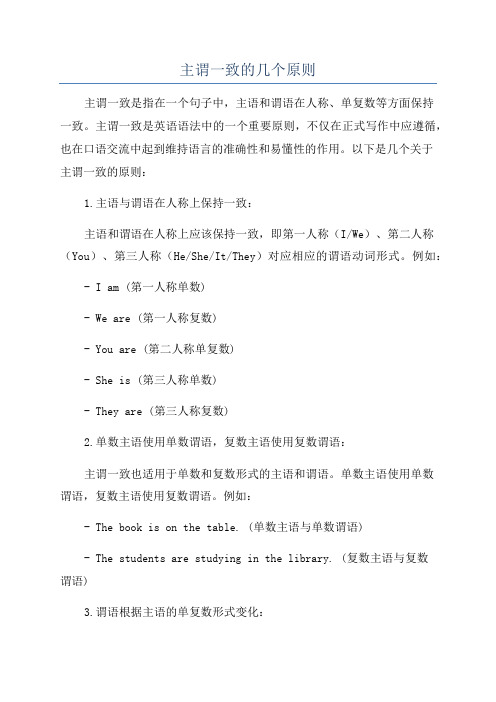
主谓一致的几个原则主谓一致是指在一个句子中,主语和谓语在人称、单复数等方面保持一致。
主谓一致是英语语法中的一个重要原则,不仅在正式写作中应遵循,也在口语交流中起到维持语言的准确性和易懂性的作用。
以下是几个关于主谓一致的原则:1.主语与谓语在人称上保持一致:主语和谓语在人称上应该保持一致,即第一人称(I/We)、第二人称(You)、第三人称(He/She/It/They)对应相应的谓语动词形式。
例如:- I am (第一人称单数)- We are (第一人称复数)- You are (第二人称单复数)- She is (第三人称单数)- They are (第三人称复数)2.单数主语使用单数谓语,复数主语使用复数谓语:主谓一致也适用于单数和复数形式的主语和谓语。
单数主语使用单数谓语,复数主语使用复数谓语。
例如:- The book is on the table. (单数主语与单数谓语)- The students are studying in the library. (复数主语与复数谓语)3.谓语根据主语的单复数形式变化:谓语动词的形式会根据主语的单复数形式而发生变化。
一般情况下,复数主语使用谓语动词的原形,而单数主语使用谓语动词的第三人称单数形式。
例如:- The dog barks. (单数主语使用第三人称单数动词形式)- The dogs bark. (复数主语使用动词原形)4.不定代词与谓语要保持一致:在使用不定代词作为主语时,谓语动词的形式要与不定代词的数保持一致。
例如:- Somebody has left their bag. (不定代词somebody与谓语动词has保持一致)5.基于语法结构的主谓一致:有些复杂的语法结构,在主谓一致上需要更多的注意。
例如:- 以either...or...、neither...nor...、not only...but also...连接两个主语时,谓语动词的形式要与靠近的主语保持一致,例如:- Either John or his friends are going to the party. (谓语动词与靠近的主语friends保持一致)- Neither the teacher nor the students were present. (谓语动词与靠近的主语students保持一致)- 当主语由as well as、along with、together with等短语结构引出时,谓语动词的形式要与前面的主语保持一致- The book, as well as the pen, is on the table. (谓语动词与前面的主语book保持一致)- 当主语由there is/are开头时,谓语动词的形式要与后面的主语保持一致,例如:- There is a book on the table. (谓语动词与后面的主语book保持一致)- 当主语由a number of、a majority of、the majority of等短语开头时,谓语动词的形式要与后面的名词保持一致,例如:总之,主谓一致是英语语法中的重要原则,人们在使用英语时应该根据主语的单复数形式、人称以及语法结构等因素,正确选择与之相对应的谓语动词形式。
主谓一致的原则

主谓一致的原则主谓一致是英语语法中的基本原则之一,指的是主语和谓语在人称和数上要保持一致。
主谓一致的正确运用能够使句子表达更加准确,符合语言规范。
本文将详细介绍主谓一致的原则,并通过一些例子来加深理解。
一、基本原则在英语句子中,主语和谓语之间必须保持一致,具体包括以下几个方面:1. 人称一致:主语是第一人称(I、we)、第二人称(you)或第三人称(he、she、it、they)时,谓语动词的形式必须与之一致。
例如:- I am a student.(我是一名学生。
)- He sings beautifully.(他唱得很美。
)2. 数一致:主语是单数形式时,谓语动词的形式也要用单数;主语是复数形式时,谓语动词的形式也要用复数。
例如:- The dog barks loudly.(这只狗叫得很大声。
)- The birds are chirping.(鸟儿正在鸣叫。
)3. 特殊情况:有些特殊情况下,主谓一致的原则会有一些变化。
例如:- 不定代词:somebody, anybody, nobody, everybody等当作主语时,谓语动词形式使用第三人称单数形式。
例如:Nobody wants to go with me.(没有人想和我一起去。
)- 连接词:and连接的主语,如果表示同一个人或物时,谓语动词的形式使用第三人称单数形式;如果表示不同的人或物时,谓语动词的形式使用第三人称复数形式。
例如:Tom and Jerry is a famous cartoon.(汤姆和杰瑞是一部著名的卡通片。
)The boys and girls are playing in the park.(男孩和女孩们正在公园里玩耍。
)二、例题分析为了更好地理解主谓一致原则,以下通过一些例题来进行详细分析。
例题1:The team _____ working on the project.(be)在这个例句中,主语是"the team",是单数形式,因此谓语动词的形式应该使用单数,填入be的单数形式"is",句子变为:"The team is working on the project."例题2:He and his friends _____ going to the concert.(be)在这个例句中,主语是"he and his friends",表示多个人,因此谓语动词的形式应该使用复数,填入be的复数形式"are",句子变为:"He and his friends are going to the concert."例题3:One of the students _____ the exam.(fail)在这个例句中,主语是"one of the students",表示多个学生中的一个,因此谓语动词的形式应该使用第三人称单数,填入fail的第三人称单数形式"fails",句子变为:"One of the students fails the exam."三、常见错误在使用主谓一致时,常见的错误包括以下几种:1. 混淆主谓的人称和数:主语与谓语之间的人称和数要保持一致,不可以混淆。
初中英语语法:主谓一致
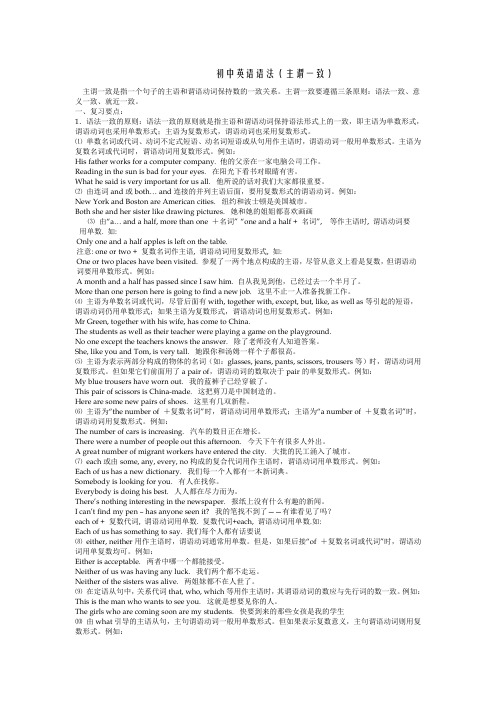
初中英语语法(主谓一致)主谓一致是指一个句子的主语和谓语动词保持数的一致关系。
主谓一致要遵循三条原则:语法一致、意义一致、就近一致。
一、复习要点:1.语法一致的原则:语法一致的原则就是指主语和谓语动词保持语法形式上的一致,即主语为单数形式,谓语动词也采用单数形式;主语为复数形式,谓语动词也采用复数形式。
⑴单数名词或代词、动词不定式短语、动名词短语或从句用作主语时,谓语动词一般用单数形式。
主语为复数名词或代词时,谓语动词用复数形式。
例如:His father works for a computer company. 他的父亲在一家电脑公司工作。
Reading in the sun is bad for your eyes. 在阳光下看书对眼睛有害。
What he said is very important for us all. 他所说的话对我们大家都很重要。
⑵由连词and或both… and连接的并列主语后面,要用复数形式的谓语动词。
例如:New York and Boston are American cities. 纽约和波士顿是美国城市。
Both she and her sister like drawing pictures. 她和她的姐姐都喜欢画画⑶由―a… and a half, more than one +名词‖―one and a half + 名词‖, 等作主语时, 谓语动词要用单数. 如:Only one and a half apples is left on the table.注意: one or two + 复数名词作主语, 谓语动词用复数形式, 如:One or two places have been visited. 参观了一两个地点构成的主语,尽管从意义上看是复数,但谓语动词要用单数形式。
例如:A month and a half has passed since I saw him. 自从我见到他,已经过去一个半月了。
高中英语语法(主谓语一致)

高中英语语法(主谓语一致)Unit16主谓一致主谓一致指句子中的主语和谓语在人称和数等方面应保持一致。
英语中主谓一致的具体应用比较复杂,高考试卷中主谓一致的基本情况可以以下述三条原则为主线进行系统地把握。
(一)主谓一致的原则一:语法一致原则语法一致原则是指句子的主语和谓语在语法形式上一致,即通常情况下,谓语动词的单复数形式依主语的单复数形式而定,主语为单数形式时谓语动词用单数形式,主语为复数形式时谓语动词也用复数形式。
例如:He is reading an English book. 他在看一本英语书。
1.可以通过下面的主谓一致一般搭配总表把握语法一致原则:一般现在时中实义动词作谓语第一人称单数I am was do have shall should动词原形第一人称复数We are were do have shall should动词原形第二人称单或复数you are were do have will would动词原形第三人称单数He, she, it, 单数名词is was does has will would动词原形+-s词尾第三人称复数they及复数名词are were do have will would动词原形2.掌握主谓一致考点中的语法一致原则,要注意两个特殊问题:(1)主语前、后加修饰语时的主谓一致问题。
主语的修饰语对主语和谓语之间的关系一般不起影响,尤其在主语后接as well as, with, along with, together with, rather than, except, but, including,besides, in addition to, added to, like, rather than, more than, no less than等插入语时,谓语仍须与主语本身保持一致。
例如:Tom as well as two of his friends was invited to the party. 汤姆以及他的两位同学一起被邀请参加了晚会A woman with Mary is coming to the hospital. 一个妇女跟同玛丽正向医院走来。
主谓一致讲解
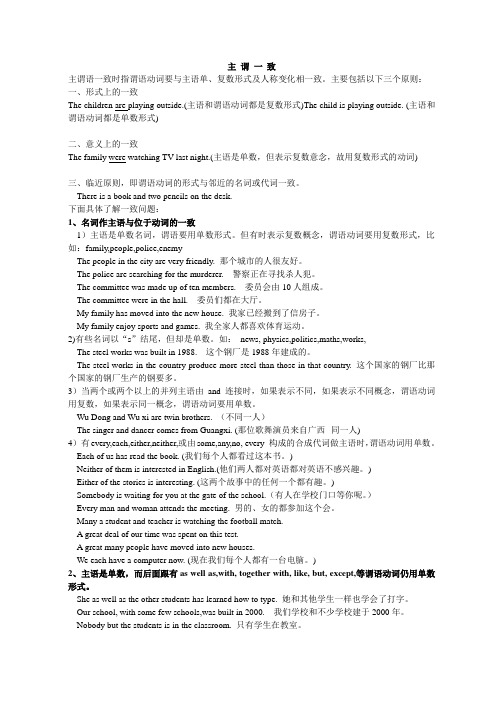
主谓一致主谓语一致时指谓语动词要与主语单、复数形式及人称变化相一致。
主要包括以下三个原则:一、形式上的一致The children are playing outside.(主语和谓语动词都是复数形式)The child is playing outside. (主语和谓语动词都是单数形式)二、意义上的一致The family were watching TV last night.(主语是单数,但表示复数意念,故用复数形式的动词)三、临近原则,即谓语动词的形式与邻近的名词或代词一致。
There is a book and two pencils on the desk.下面具体了解一致问题:1、名词作主语与位于动词的一致1)主语是单数名词,谓语要用单数形式。
但有时表示复数概念,谓语动词要用复数形式,比如:family,people,police,enemyThe people in the city are very friendly. 那个城市的人很友好。
The police are searching for the murderer. 警察正在寻找杀人犯。
The committee was made up of ten members. 委员会由10人组成。
The committee were in the hall. 委员们都在大厅。
My family has moved into the new house. 我家已经搬到了信房子。
My family enjoy sports and games. 我全家人都喜欢体育运动。
2)有些名词以“s”结尾,但却是单数。
如:news, physics,politics,maths,works,The steel works was built in 1988. 这个钢厂是1988年建成的。
The steel works in the country produce more steel than those in that country. 这个国家的钢厂比那个国家的钢厂生产的钢要多。
主谓一致最全面讲解
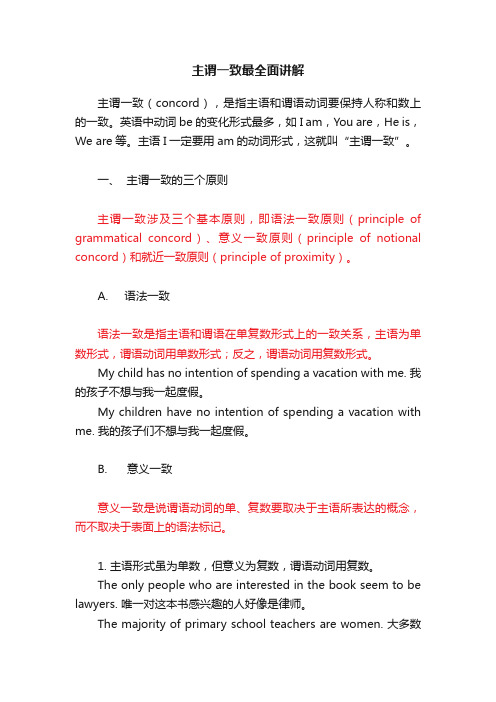
主谓一致最全面讲解主谓一致(concord),是指主语和谓语动词要保持人称和数上的一致。
英语中动词be的变化形式最多,如I am,You are,He is,We are等。
主语I一定要用am的动词形式,这就叫“主谓一致”。
一、主谓一致的三个原则主谓一致涉及三个基本原则,即语法一致原则(principle of grammatical concord)、意义一致原则(principle of notional concord)和就近一致原则(principle of proximity)。
A. 语法一致语法一致是指主语和谓语在单复数形式上的一致关系,主语为单数形式,谓语动词用单数形式;反之,谓语动词用复数形式。
My child has no intention of spending a vacation with me. 我的孩子不想与我一起度假。
My children have no intention of spending a vacation with me. 我的孩子们不想与我一起度假。
B. 意义一致意义一致是说谓语动词的单、复数要取决于主语所表达的概念,而不取决于表面上的语法标记。
1. 主语形式虽为单数,但意义为复数,谓语动词用复数。
The only people who are interested in the book seem to be lawyers. 唯一对这本书感兴趣的人好像是律师。
The majority of primary school teachers are women. 大多数小学老师都是女的。
2. 主语形式为复数,而意义上却是单数,谓语动词用单数。
Billiards is becoming more and more popular in some cities. 桌球在一些城市里越来越受欢迎。
C. 就近一致就近一致是指当主语由两个或两个以上名词或代词组成时,谓语动词的数要与它紧邻的名词或代词的数一致。
主谓一致的规则与注意点
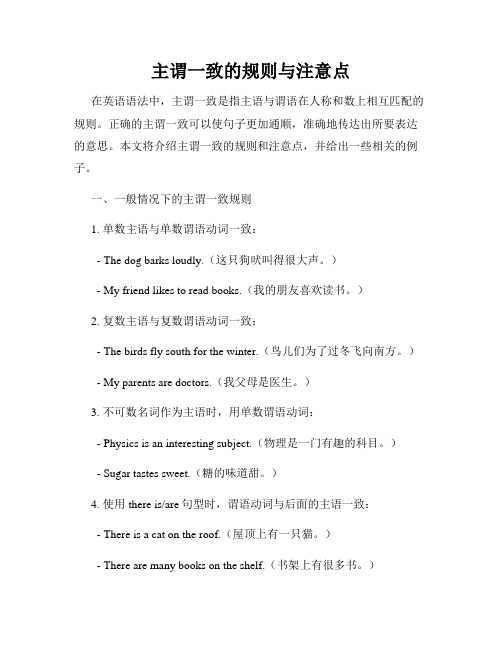
主谓一致的规则与注意点在英语语法中,主谓一致是指主语与谓语在人称和数上相互匹配的规则。
正确的主谓一致可以使句子更加通顺,准确地传达出所要表达的意思。
本文将介绍主谓一致的规则和注意点,并给出一些相关的例子。
一、一般情况下的主谓一致规则1. 单数主语与单数谓语动词一致:- The dog barks loudly.(这只狗吠叫得很大声。
)- My friend likes to read books.(我的朋友喜欢读书。
)2. 复数主语与复数谓语动词一致:- The birds fly south for the winter.(鸟儿们为了过冬飞向南方。
) - My parents are doctors.(我父母是医生。
)3. 不可数名词作为主语时,用单数谓语动词:- Physics is an interesting subject.(物理是一门有趣的科目。
)- Sugar tastes sweet.(糖的味道甜。
)4. 使用there is/are句型时,谓语动词与后面的主语一致:- There is a cat on the roof.(屋顶上有一只猫。
)- There are many books on the shelf.(书架上有很多书。
)二、特殊情况下的主谓一致规则1. 当主语由“each”, “every”, “either”, “neither”等修饰时,谓语动词用单数形式:- Each student needs to bring their own pen.(每个学生都需要带上自己的钢笔。
)- Neither of them is available tomorrow.(他们中的任何一个明天都不可用。
)2. 当主语由“either...or”, “neither...nor”, “not only...but also”等连接时,谓语动词与最靠近的主语一致:- Either the cat or the dogs are sleeping.(要么猫要么狗正在睡觉。
主谓一致三原则
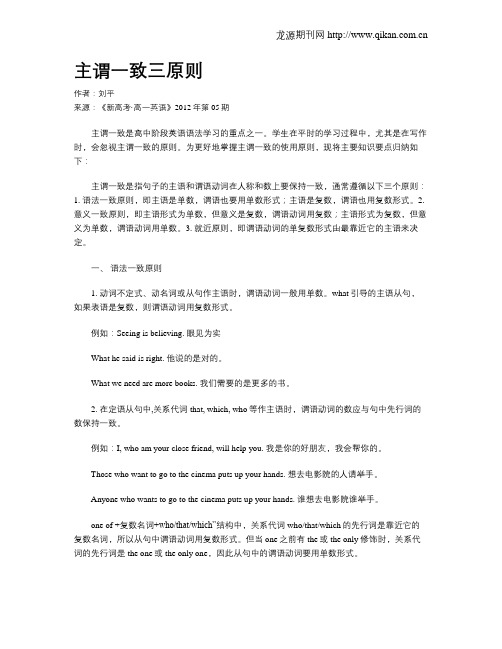
主谓一致三原则作者:刘平来源:《新高考·高一英语》2012年第05期主谓一致是高中阶段英语语法学习的重点之一。
学生在平时的学习过程中,尤其是在写作时,会忽视主谓一致的原则。
为更好地掌握主谓一致的使用原则,现将主要知识要点归纳如下:主谓一致是指句子的主语和谓语动词在人称和数上要保持一致,通常遵循以下三个原则:1. 语法一致原则,即主语是单数,谓语也要用单数形式;主语是复数,谓语也用复数形式。
2. 意义一致原则,即主语形式为单数,但意义是复数,谓语动词用复数;主语形式为复数,但意义为单数,谓语动词用单数。
3. 就近原则,即谓语动词的单复数形式由最靠近它的主语来决定。
一、语法一致原则1. 动词不定式、动名词或从句作主语时,谓语动词一般用单数。
what引导的主语从句,如果表语是复数,则谓语动词用复数形式。
例如:Seeing is believing. 眼见为实What he said is right. 他说的是对的。
What we need are more books. 我们需要的是更多的书。
2. 在定语从句中,关系代词that, which, who等作主语时,谓语动词的数应与句中先行词的数保持一致。
例如:I, who am your close friend, will help you. 我是你的好朋友,我会帮你的。
Those who want to go to the cinema puts up your hands. 想去电影院的人请举手。
Anyone who wants to go to the cinema puts up your hands. 谁想去电影院谁举手。
one of +复数名词+who/that/which”结构中,关系代词who/that/which的先行词是靠近它的复数名词,所以从句中谓语动词用复数形式。
但当one之前有the或the only 修饰时,关系代词的先行词是the one或the only one,因此从句中的谓语动词要用单数形式。
主谓一致知识点
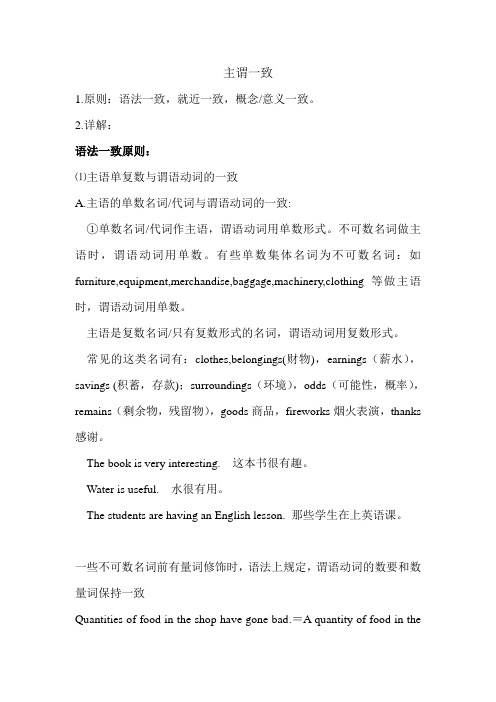
主谓一致1.原则:语法一致,就近一致,概念/意义一致。
2.详解:语法一致原则:⑴主语单复数与谓语动词的一致A.主语的单数名词/代词与谓语动词的一致:①单数名词/代词作主语,谓语动词用单数形式。
不可数名词做主语时,谓语动词用单数。
有些单数集体名词为不可数名词:如furniture,equipment,merchandise,baggage,machinery,clothing等做主语时,谓语动词用单数。
主语是复数名词/只有复数形式的名词,谓语动词用复数形式。
常见的这类名词有:clothes,belongings(财物),earnings(薪水),savings (积蓄,存款);surroundings(环境),odds(可能性,概率),remains(剩余物,残留物),goods商品,fireworks烟火表演,thanks 感谢。
The book is very interesting. 这本书很有趣。
Water is useful. 水很有用。
The students are having an English lesson. 那些学生在上英语课。
一些不可数名词前有量词修饰时,语法上规定,谓语动词的数要和数量词保持一致Quantities of food in the shop have gone bad.=A quantity of food in theshop has gone bad. 那家商店大量的食物都变质了②many a+单数名词做主语,谓语动词用单数。
Many+复数名词作主语,谓语动词用复数。
Many a worker was killed in the accident. 在这次事故中死了许多工人。
③more than one+单数名词做主语,谓语动词用单数,more +复数名词+than one做主语,谓语动词用复数。
More than one person has known it. 不止一个人知道这件事。
主谓一致的规则及应用

主谓一致的规则及应用主谓一致是英语语法中的基本规则,指的是主语与谓语在人称和数上保持一致。
正确运用主谓一致规则会增强句子的准确性和流畅性,使表达更加清晰。
本文将介绍主谓一致的规则,并给出一些应用实例。
一、基本规则1. 单数主语与单数谓语动词一致。
例如:- The cat is sleeping.(这只猫在睡觉。
)- She runs every morning.(她每天早上跑步。
)2. 复数主语与复数谓语动词一致。
例如:- The students are studying in the library.(学生们正在图书馆学习。
)- They play football every weekend.(他们每个周末踢足球。
)3. 不可数名词作主语时,谓语动词通常使用单数形式。
例如:- Rice is a staple food in many countries.(米饭是许多国家的主食。
)- Water is essential for life.(水对生命至关重要。
)4. 用作主语的不定代词通常与单数谓语动词一致。
例如:- Everyone wants to be happy.(每个人都想要快乐。
)- Somebody has left their bag here.(有人把包落在这里了。
)5. 连接词and连接的两个主语,谓语动词通常与复数一致。
例如:- Tom and Jerry are good friends.(汤姆和杰瑞是好朋友。
)- My mom and dad like gardening.(我爸爸妈妈喜欢园艺。
)二、特殊情况1. 数量词、百分数加名词短语作主语时,谓语动词取决于名词短语中的名词单复数形式。
例如:- Fifty percent of the students are girls.(百分之五十的学生是女孩。
)- A lot of money has been spent on this project.(这个项目花费了很多钱。
主谓一致的基本规则
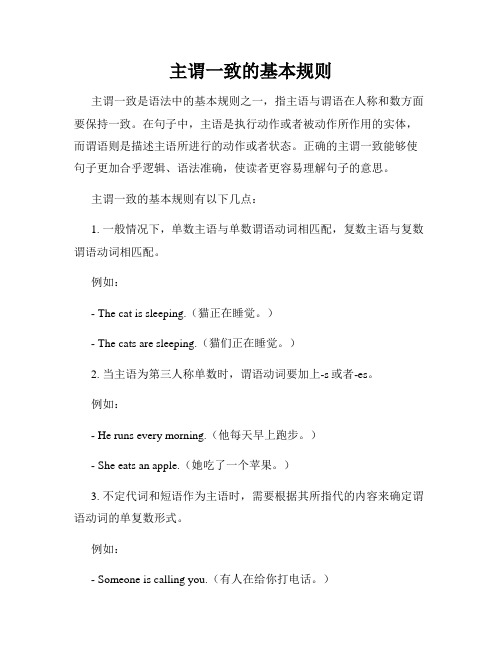
主谓一致的基本规则主谓一致是语法中的基本规则之一,指主语与谓语在人称和数方面要保持一致。
在句子中,主语是执行动作或者被动作所作用的实体,而谓语则是描述主语所进行的动作或者状态。
正确的主谓一致能够使句子更加合乎逻辑、语法准确,使读者更容易理解句子的意思。
主谓一致的基本规则有以下几点:1. 一般情况下,单数主语与单数谓语动词相匹配,复数主语与复数谓语动词相匹配。
例如:- The cat is sleeping.(猫正在睡觉。
)- The cats are sleeping.(猫们正在睡觉。
)2. 当主语为第三人称单数时,谓语动词要加上-s或者-es。
例如:- He runs every morning.(他每天早上跑步。
)- She eats an apple.(她吃了一个苹果。
)3. 不定代词和短语作为主语时,需要根据其所指代的内容来确定谓语动词的单复数形式。
例如:- Someone is calling you.(有人在给你打电话。
)- A group of students is studying English.(一群学生正在学习英语。
)4. 当主语由连接词and连接时,只有当两个主语均为单数时,谓语动词才为单数形式,其他情况下谓语动词为复数形式。
例如:- Tom and John are going to the park.(汤姆和约翰要去公园。
)- The dog and the cat is eating.(狗和猫正在吃东西。
)5. 在使用there is和there are结构时,谓语动词的单复数形式取决于后面的主语。
例如:- There is a book on the table.(桌子上有一本书。
)- There are two cups on the table.(桌子上有两个杯子。
)总结来说,主谓一致是为了保持句子的语法规范和逻辑一致性,使读者更好地理解句子的意思。
在写作和口语表达中,我们需要遵循主谓一致的基本规则,以确保句子的正确性和可读性。
句子结构解析主谓一致的基本规则

句子结构解析主谓一致的基本规则在汉语中,主谓一致是一种基本的语法规则,指的是主语和谓语在人称、数与时态上保持一致。
主谓一致是构建正确句子结构的关键要素之一,不仅仅是汉语中,世界上几乎所有语言都存在这个规则。
下面将对主谓一致的基本规则进行解析。
1. 人称一致主语的人称与谓语动词的人称需要保持一致。
例如:- 第一人称:我喜欢读书。
- 第二人称:你去哪里了?- 第三人称:他们正在讨论这个问题。
2. 数的一致主语的单复数形式与谓语动词的单复数形式需要保持一致。
例如:- 单数主语:这本书很有趣。
- 复数主语:这些人在锻炼身体。
3. 时态一致主谓一致还需要在时态方面保持一致。
例如:- 现在时态:他们正在开会。
- 过去时态:昨天他走了。
总的来说,主谓一致是构成正确句子结构的必要条件,遵守主谓一致规则可以使句子更加准确、流畅。
在写作和口语表达中,我们需要注意主谓一致的基本规则,以避免语法错误。
此外,还有一些需要注意的特殊情况:1. 复合主语当句子中有复合主语时,主谓一致要按照就近原则来决定谓语动词的形式。
例如:- 他和他的朋友都喜欢运动。
2. 存在形式主语有些句子中的主语是“有”字结构(形式主语),谓语动词的形式由后面的实际主语决定。
例如:- 在桌子上有一本书。
3. 特殊谓语动词有些谓语动词的形式比较特殊,需要特别注意。
例如:- There is/are结构:There is a cat in the room.(房间里有一只猫。
)在写作过程中,我们要注意主谓一致的规则,保持句子结构的准确和语言的规范。
只有遵循主谓一致的基本规则,我们才能构建出流畅、准确的句子,让读者更好地理解和接受我们的表达。
英语语法原则主谓一致三原则
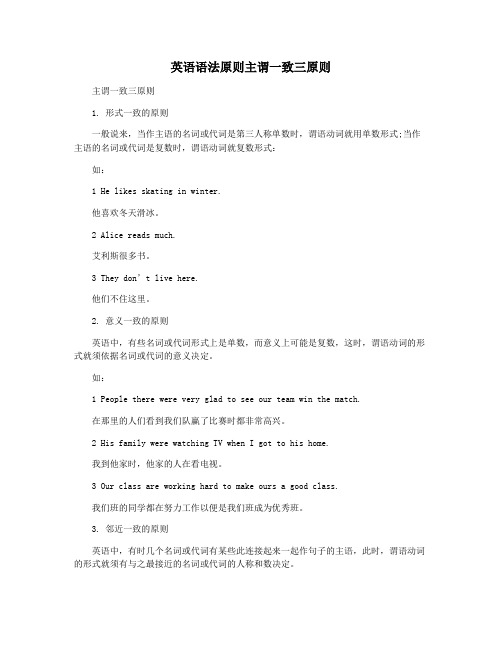
英语语法原则主谓一致三原则主谓一致三原则1. 形式一致的原则一般说来,当作主语的名词或代词是第三人称单数时,谓语动词就用单数形式;当作主语的名词或代词是复数时,谓语动词就复数形式:如:1 He likes skating in winter.他喜欢冬天滑冰。
2 Alice reads much.艾利斯很多书。
3 They don’t live here.他们不住这里。
2. 意义一致的原则英语中,有些名词或代词形式上是单数,而意义上可能是复数,这时,谓语动词的形式就须依据名词或代词的意义决定。
如:1 People there were very glad to see our team win the match.在那里的人们看到我们队赢了比赛时都非常高兴。
2 His family were watching TV when I got to his home.我到他家时,他家的人在看电视。
3 Our class are working hard to make ours a good class.我们班的同学都在努力工作以便是我们班成为优秀班。
3. 邻近一致的原则英语中,有时几个名词或代词有某些此连接起来一起作句子的主语,此时,谓语动词的形式就须有与之最接近的名词或代词的人称和数决定。
如:1 There is a desk and five chairs in his room.他房间里有一张办公桌和五把椅子。
2 There are five chairs and a desk in his room.他房间里有五把椅子和一张办公桌。
3 Either you or Li Lei is going to be sent there.要么是你要么是李蕾将被派到那里去。
4 Are either you or Li Lei going to be sent there.是你将被派到那里去还是李蕾将被派到那里去?英语基本句型归纳基本句型一:S V 主+谓主语:可以作主语的成分有名词如boy,主格代词如you,动词不定式,动名词等。
主谓一致解题技巧
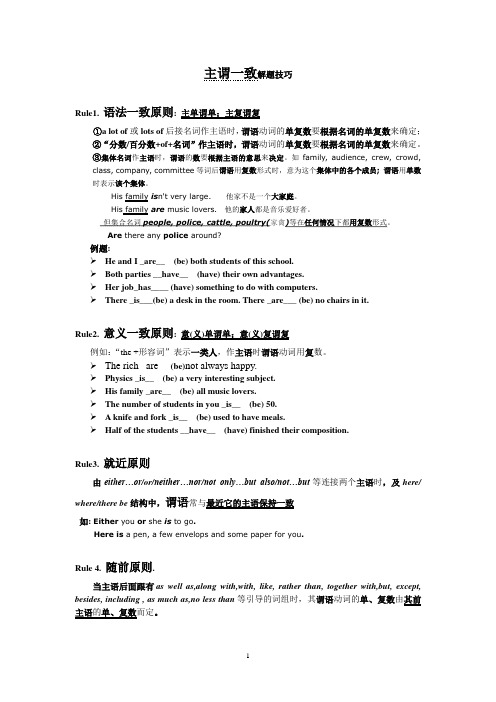
主谓一致解题技巧Rule1. 语法一致原则: 主单谓单;主复谓复①a lot of或lots of后接名词作主语时,谓语动词的单复数要根据名词的单复数来确定;②“分数/百分数+of+名词”作主语时,谓语动词的单复数要根据名词的单复数来确定。
③集体名词作主语时,谓语的数要根据主语的意思来决定。
如family, audience, crew, crowd,class, company, committee等词后谓语用复数形式时,意为这个集体中的各个成员; 谓语用单数时表示该个集体。
His family is n't very large.他家不是一个大家庭。
His family are music lovers.他的家人都是音乐爱好者。
但集合名词people, police, cattle, poultry(家禽)等在任何情况下都用复数形式。
Are there any police around?例题:He and I _are__ (be) both students of this school.Both parties __have__ (have) their own advantages.Her job_has____ (have) something to do with computers.There _is___(be) a desk in the room. There _are___ (be) no chairs in it.Rule2. 意义一致原则: 意(义)单谓单;意(义)复谓复例如:“the +形容词”表示一类人,作主语时谓语动词用复数。
The rich _are__ (be)not always happy.Physics _is__ (be) a very interesting subject.His family _are__ (be) all music lovers.The number of students in you _is__ (be) 50.A knife and fork _is__ (be) used to have meals.Half of the students __have__ (have) finished their composition.Rule3. 就近原则由either…or/or/neither…nor/not only…but also/not…but等连接两个主语时,及here/ where/there be结构中,谓语常与最近它的主语保持一致如: Either you or she is to go.Here is a pen, a few envelops and some paper for you.Rule 4. 随前原则.当主语后面跟有as well as,along with,with, like, rather than, together with,but, except, besides, including , as much as,no less than等引导的词组时,其谓语动词的单、复数由其前主语的单、复数而定。
- 1、下载文档前请自行甄别文档内容的完整性,平台不提供额外的编辑、内容补充、找答案等附加服务。
- 2、"仅部分预览"的文档,不可在线预览部分如存在完整性等问题,可反馈申请退款(可完整预览的文档不适用该条件!)。
- 3、如文档侵犯您的权益,请联系客服反馈,我们会尽快为您处理(人工客服工作时间:9:00-18:30)。
主谓一致1. Attending concerts on the campus____ part of the pleasure of college life.A. areB. isC. it isD. being2. E-mail, as well as telephones, ____ an important part in daily communication.A. is playingB. have playingC. are playingD. play3. Books of this kind____ well.A. sellB. sellsC. are soldD. is sold4. --- Each of the students, working hard at his or her lesson, ____ to go to university.--- So do I.A. hopeB. hopesC. hopingD. hoped5. ____ of the land in that district____ covered with trees and grass.A. Two fifth, isB. Two fifth, areC. Two fifths, isD. Two fifths, are6. As result of destroying the forests, a large____ of desert____ covered the land.A. number, hasB. quantity, hasC. number, haveD. quantity, have7. Xiao Lin, just like me, ____ fond of folk songs.A. isB. areC. amD. were8. The computers on the table____ Professor Smith.A. belongsB. are belonged toC. belongs toD. belong to9. One of the new books____ several pages____.A. has, missedB. have, missingC. has, missingD. have, missed10. Lots of advice____ them on how to fight against sandstorm.A. has givenB. are givenC. was givenD. already gave11. Writing stories and articles____ what I enjoy most.A. isB. have beenC. wasD. are12. I can’t help you. ____ of my hands are full of mud.A. BothB. EachC. AllD. Every13. Every year around the end of October, this kind of____ because they will get rotten quickly.A. orange is on saleB. oranges are for saleC. the orange are on saleD. oranges sells well14. The visiting team____A. are having a wonderful dinnerB. is having wonderful dinnerC. is having wonderful dinnerD. are having wonderful dinner15. Every boy and every girl____ Mr. Wang as he devoted himself____.A. likes, to teachingB. liked, to teachC. like, to teachingD. like, to teach16. Lots of rubbish____ every day.A. is thrownB. are thrown awayC. has thrownD. throws17. I’ve told you that the third and last part of the story____ most inter esting.A. isB. areC. wasD. were18. All but one____ to see him off in the airport.A. have beenB. has beenC. have goneD. go19. The____ are collecting money, food, clothing and medicines for the flooding areas.A. officialB. publicC. Red CrossD. organization20. The police____ every reason to arrest him.A. hasB. needsC. haveD. believe21. ____ have a racing car.A. EachB. Each of themC. Every of themD. They each22. The police____ on the scene a few minutes after the murder occurred.A. had beenB. wereC. having beenD. being23. The trousers____ the boy sitting over there.A. belongs toB. belong toC. is belong toD. are belong to24. One million pounds____ a large sum of money.A. areB. isC. have beenD. has been25. Mr. Iglesias, the famous Spanish singer, together with his girl friend and his father, ____ visiting Shanghai now.A. is going toB. areC. are toD. is26. His “Selected Poem’’ ____ in 1990.A. was first publishedB. has been first publishedC. were first publishedD. have been first published27. ____ students have visited the exhibition.A. A great manyB. A great many ofC. A good many ofD. The great number of28. Every boy and every girl in the club____ invited to attend the evening party.A. have beenB. has beenC. areD. have not29. John as well as I____ your plan.A. agree toB. agrees toC. agree withD. agrees with30. I want two of you to clean the window. The rest____ sweep the floor.A. is toB. will be toC. are toD. is going to31. Mrs. Jackson, together with her husband and daughter____ the palace ball.A. has gone toB. have gone toC. are going toD. have been to32. Professor Smith along with his assistants____ on the project day and night to meet the deadline.A. workB. workingC. is workingD. are working33. Zhang’s family____ rather big, with twelve people in all.A. isB. areC. beingD. was34. “Every magazine except these two____,’’ said the librarian.A. has been borrowedB. has been lentC. have been borrowedD. have been lent35. Mary as well as two of her friends____ during the concert the day before yesterday.A. invitedB. was invitedC. were invitedD. had been invited36. I have three brothers. One is in Beijing, ____ together with my parents, ____ in Nanjing.A. the others, areB. the other, isC. other, areD. other, is37. ____object to the plan.A. The teacher rather than the studentsB. Not only the teacher but also the studentsC. Not only the students but also the teacherD. The teacher in addition to the students38. ____ the students____ the teacher____ to see the film again.A. Not only, but also, wantB. Either, or, wantC. Both, and, wantsD. Not, but, wants39. The police____ every reason to arrest Tim.A. hasB. needsC. haveD. believes40. Bread and butter, which most westerners usually eat, ____ not greatly accepted by us Chinese.A. isB. areC. hasD. have41. When he pushed his way off the crowded bus, he found about half of his eggs____ broken.A. wasB. wereC. areD. have42. The number of tickets sold yesterday____ much bigger than we had expected.A. isB. wasC. areD. were43. Telephone messages for the manager____ on her desk but she didn’t notice them.A. were leftB. was leftC. was leavingD. were leaving44. Reading books____ the only habit that he developed when he was in the university.A. wereB. wasC. formedD. have been45. All____ ready for the celebration, and all____ eager to have a good time.A. was, wasB. were, wereC. was, wereD. were, was46. Her family____ quite large, and all her family ____ pop fans.A. is, isB. are, areC. is, areD. are, is47. I should say the first five question were quite easy, but the rest____ hard.A. wereB. wasC. areD. is48. I don’t think that five hundred pounds____ a big sum for rich man like you.A. areB. isC. wereD. is to be49. Not even one of the hundred students who took the test____ passed.A. haveB. hasC. wasD. were50. Dick, ____ his students, was at the party. He said to me that he did not know anyone____ me there.A. together with, besidesB. along with, exceptC. rather than, exceptD. instead of, besides51. 30% of the cattle____ thin, but the rest____ fat.A. are, areB. is, isC. is, areD. are, is52. Can you tell me the number of the students who____.A. is going to attend the sports meetingB. are going to attend the lectureC. has taken part in the lectureD. wants to take part in the sports meeting53. Miss White____ her parents is going to pay a visit to the Great Wall.A. notB. andC. orD. nor54. Two thirds of the people there____ that more than two thirds of their time ____ spent on reading.A. have said, isB. said, wereC. have said, areD. will say, have been55. Life there____ quite comfortable in the last century.A. said to beB. was said to beC. was to sayD. had been said56. You____ to work for 40 hours a week if you____ the job.A. expect, will takeB. are expected, takeC. will expect, have takenD. expect, take57. The sports meet will____ off if it____.A. put, rainsB. put, will rainC. be put, is rainedD. be put, rains58. The boy learned that all his toys____ while he____ out.A. were put away, wasB. had put away, wasC. would put away, wasD. were put away, would be59. Great changes____ swimming in the river, but only____ can swim across it.A. took, were startedB. had taken, startedC. were taken, startedD. have taken, started60. Many a man____ swimming in the river, but only____ can swim across it.A. go, a fewB. goes, a fewC. go, fewD. goes, few61. Mr. Mefan, together with his wife and daughter, ____ going to Japan next month.A. areB. isC. will beD. would be62. What he says and what he does____.A. do not agreeB. does not agreeC. don’t agree withD. not agree63. Only a knife and fork____ on the table. There is nothing else.A. areB. are leftC. isD. was64. Shanghai Book Traders____ an enterprise____ in the import and export of publications and stationery.A. is, to specializeB. are, specializingC. is, specializingD. are, being specialized65. Large amounts of money____ a new airport.A. were spent buildingB. was spent buildingC. were cost to buildD. was cost building66. ____ going to the exhibition.A. All but he and me isB. All but he and me areC. All but he and I areD. All but he and I am67. About____ in that country____ out of work.A. 20 percent people, isB. 20 percent of people, areC. 20 percent of the people, areD. 20 percent people, are68. Six times three____ eighteen.A. equalB. is equalC. equalsD. equals to69. Every boy and every girl____ present____ the farewell party yesterday.A. was, toB. was, atC. were, atD. were, to70. Books of this kind____ well.A. sellB. sellsC. are soldD. is sold71. Many a girl____ to play football in the past few years.C. learnsD. has learnt72. He is the one of the students who____ always praised by the teacher.A. isB. areC. have beenD. has73. How close parent are to their children____ a strong influence on the character of the children.A. haveB. hasC. havingD. to have74. Sports and games____ one healthy while reading books____ one wise.A. make, makeB. makes, makeC. makes, makesD. make, makes75. The cashier and storeman____ found____ in the store.A. was, lainB. were, lyingC. were, lainD. was, lying76. My bicycle is all right. ____ repairing.A. Both of the wheels needB. Neither of the wheels needsC. All the wheels needD. None of the wheels needs77. No one in the department but Tom and I____ that the director is going to resign.A. knowsB. knowC. have knownD. am to know78. Actually twenty miles____ a long way to go.A. areB. have beenC. isD. has been79. The football team, ____ the first game, will immediately prepare their training for the next one.A. who has wonB. that wonC. who have wonD. who won80. All____ ready for the party, I am sure____ guests will have a good time.A. is, allB. are, all theC. is, all theD. are, all of the81. That hr has got so many prizes these years____ him famous.A. madeB. makeC. makesD. had made82. The teacher is very strict with his students. He requests that every student____ class.A. be not late forB. is not late forC. don’t be late forD. not be late for83. Tom in one of the boys who____ always on time.A. isB. amC. areD. was84. The singer and dancer____ our evening.A. is to attendB. are to attendC. were to attendD. is attend85. I, who____ your friend, will try my best to help you.A. amB. be86. He said that____ plenty of room for everybody.A. there wereB. they wereC. it wasD. there was87. Two hours____ enough for us.A. isB. areC. haveD. were88. Neither Bill nor his parents____ at home.A. isB. areC. hasD. was89. The Canterbury Tales___ written by Chaucer.A. has beenB. wereC. wasD. had been90. The singer and dancer____ to make a speech this afternoon.A. isB. areC. is aboutD. are about91. The audience in the theatre____ in a variety of ways, some in suits and dresses, some in jeans last night.A. has dressedB. had dressesC. dressD. were dressed92. ____ of the students are girls, and the rest____ boys.A. Two third, isB. The two third, areC. Two thirds, areD. Two third, is93. The beautiful____ not always the same as the good.A. areB. beC. isD. it is94. Jin Mao Building in Pu Dong area is one of the most beautiful buildings in Shanghai. Many a wonderful night____ there by me.A. have been spentB. has been spentC. have spentD. has spent95. There____ a bottle of wine and a half left at time.A. isB. areC. have beenD. has had。
